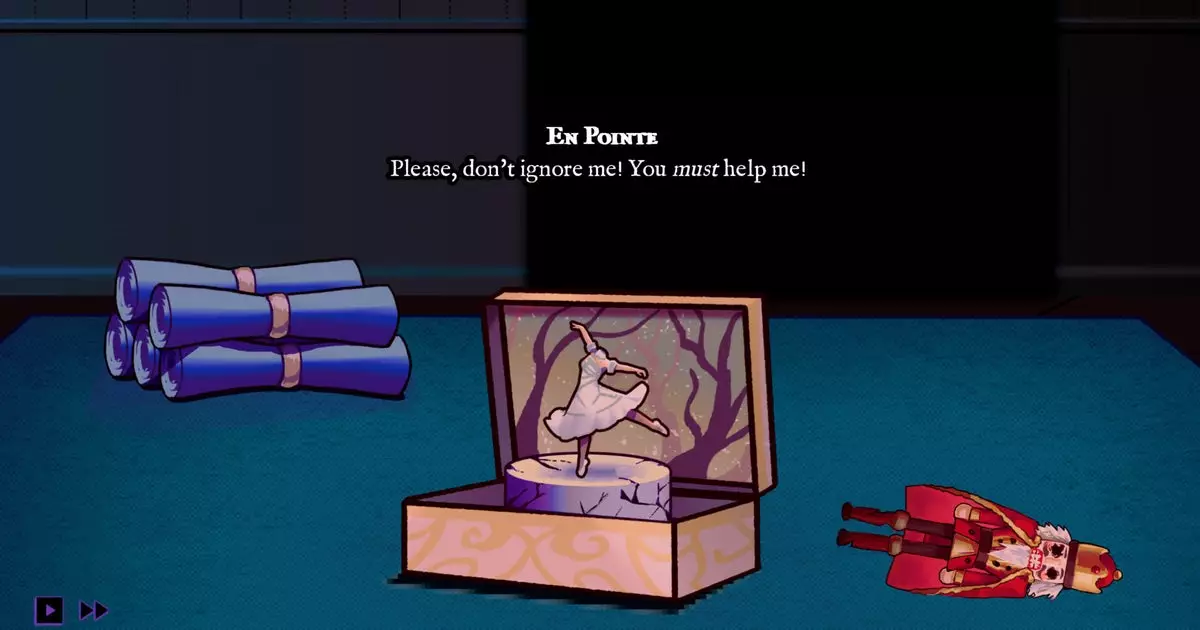At first glance, “Toy Box” might evoke holiday cheer, suggesting a whimsical aesthetic reminiscent of seasonal joy. However, a closer look reveals it dives deeply into themes of horror, morality, and the uncanny nature of childhood toys. This visual novel doesn’t just shatter the festive facade; it deconstructs our understanding of innocence and play, leading players through an unsettling narrative filled with macabre choices and unsettling consequences.
At the core of the game, players step into the shoes of a toy inspector, working under the cryptic guidance of the Grand Toy Maker—a figure both jovial and ominous. Faceless and authoritative, he instructs players to disassemble toys based on eldritch guidelines. Each toy presents a choice: should it be salvaged or “sentenced” to destruction? The decision is complicated by the fact that these toys are not inanimate; they possess consciousness. As players begin to extract their components, the toys reveal their memories and experiences tied to suffering and malice, creating a chilling atmosphere that tests the moral compass of the player.
The narrative prompts players to confront intense ethical dilemmas. While the instinct might be to preserve these once-charming figures, their pleas become increasingly disturbing. A ballerina’s soft plea for mercy clashes with dark tales of torment, an uneasy juxtaposition that challenges the player’s empathy and sense of duty. The game capitalizes on the age-old fear of toys coming to life, turning the metaphorical innocence of childhood into something far more sinister.
What makes “Toy Box” particularly unsettling isn’t merely the act of disassembly, but the twisted representations of childhood nostalgia that toys symbolize. They exist within a strange liminal space, caught between familiar comfort and deep-seated dread. The game deftly explores this uncanny valley, highlighting the discomfort many feel in the presence of lifelike objects. The toys embody the childhood memory of playthings, yet they converse in a dissonant, disturbing manner as they hint at a hidden darkness. Consequently, the horror transcends jump scares or graphic depictions; it burrows deeper into the psyche, evoking dread through psychological themes.
Developed by DEADline Studios, a proudly queer and POC-owned company, “Toy Box” aims to delve into multifaceted narratives about the human experience. The creators emphasize illustrating the spectrum of existence—from joy to pure horror—mirroring the complexity of life itself in an engaging yet unsettling way. The game serves as a stark reminder of the deeply human narratives that can be unearthed even from seemingly simple storylines in video games.
As players progress, they must face a myriad of chilling content warnings, from violence and body horror to unsettling religious themes. While some might critique this choice of themes as overly graphic or gratuitous, they serve a purpose in painting the complex narrative surrounding the human experience with honesty. Paradoxically, “Toy Box” thrives in the discomfort it creates, offering a glimpse into the darker sides of both toys and the stories we tell—a challenging yet engaging endeavor for the player.
Disassembling inanimate objects has rarely been so compelling, yet “Toy Box” has harnessed this concept to create a disturbingly intriguing gameplay mechanic. The act of dismantling toys as a mode of storytelling offers a novel path for future gaming projects, inviting new dimensions into interactive narratives. Drawing parallels to games like “Hardspace: Shipbreaker,” which portrays the deconstruction of spaceships amidst darker themes of servitude, “Toy Box” raises the stakes by introducing emotional stakes tied to the toys’ sentience.
“Toy Box” invites players to explore their discomfort and confront the shadows lurking beneath playful facades. Its themes of disassembly, moral ambiguity, and haunting storytelling offer a fresh voice in the world of horror gaming. It is a testament to how video games can engage with profound societal themes, challenging players to question their choices while navigating through the strangeness of innocent recollections gone awry. As gaming continues to evolve, “Toy Box” showcases the potential for deeply affecting narratives rooted in the heart of horror.

